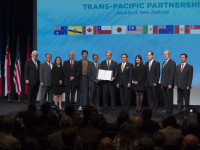Season one of the Law Bytes podcast is in the books with 22 full episodes that covered a wide range of digital policy issues (plus one preview episode). New episodes will resume in the fall, but in the meantime I’ll be revisiting some of the major themes from the first season. Privacy and security issues was a prominent part of the discussion starting with the very first full episode featuring a conversation with UK Information Commissioner Elizabeth Denham. Commissioner Denham reflected on her years in Canada, particularly the Canadian Facebook investigation, concerns with the Google Buzz service, and the need for Canadian legislative reform in order to address today’s privacy challenges.
Latest Posts
It’s Back: The Netflix Tax Debate Returns for the 2019 Election
Four years ago, then-prime minister Stephen Harper used the first week of the 2015 federal election campaign to pledge that if re-elected his government would not institute a Netflix tax. My Globe and Mail op-ed notes that the Liberals responded with a no Netflix tax promise of their own, which became government policy when Justin Trudeau was elected a few months later. Yet as Canada heads toward another election this fall, Canadian Heritage Minister Pablo Rodriguez and his party seem ready to place the spotlight on Netflix taxes once again. Only this time, the government will call out opposition parties that do not commit to new Internet taxes.
The LawBytes Podcast, Episode 23: The WIPO BRIP Database – Rick Shera on the MEGA Experience and the Dangers of False IP Claims
The last episode of Season One of the Lawbytes podcast (new episodes will resume in September) returns to WIPO, the World Intellectual Property Organization and its proposed BRIP database. The BRIP database, which stands for Building Respect for Intellectual Property, will be a database of allegedly infringing websites. While some of the details remain sketchy, the basics are that BRIP will be a database of allegedly infringing websites that could be used by advertisers to stop advertising on those sites, payment providers to stop service, or even site blocking initiatives to mandate ISP blocking. Yet the BRIP database currently envisions the possibility of lobby groups such as the movie and music associations inserting sites in the database with no oversight, no review, and not even any transparent standards.
That approach caught the attention of Rick Shera, a lawyer in New Zealand with Lowndes Jordan and one of that country’s leading IP and Internet law experts. Rick posted a Twitter stream on the risks associated with false IP accusations, speaking from the experience of one of his clients. He joins me on the podcast this week to discuss the experience of MEGA and the risks of false IP claims.
Canadian Government Consults on Expanding Pacific Trade Treaty to UK, Taiwan, South Korea, and Thailand
The Canadian government has launched a public consultation on expanding the Comprehensive and Progressive Agreement for Trans-Pacific Partnership (CPTPP, formerly TPP) to other countries, specifically citing the UK, Taiwan, South Korea, and Thailand. The consultation could raise significant concerns as the UK would be the first non-Pacific country in the agreement and Taiwan could spark a response from China. Moreover, opening the agreement to new countries must likely factor in the possibility that the U.S. might want to re-enter the agreement if there is a change in administration in 2020.
The LawBytes Podcast, Episode 22: Navigating Intermediary Liability for the Internet – A Conversation with Daphne Keller
The question of what responsibility should lie with Internet platforms for the content they host that is posted by their users has been the subject of debate around in the world as politicians, regulators, and the broader public seek to navigate policy choices to combat harmful speech that have implications for freedom of expression, online harms, competition, and innovation. To help sort through the policy options, Daphne Keller, the Director of Intermediary Liability at Stanford’s Center for Internet and Society, joins the podcast this week. She recently posted an excellent article on the Balkinization blog that provided a helpful guide to intermediary liability law making and agreed to chat about how policy makers can adjust the dials on new rules to best reflect national goals.











